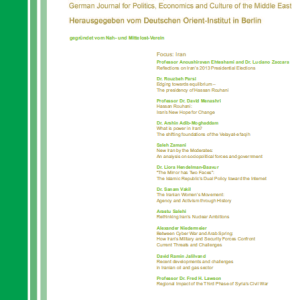Shop
Showing 33–48 of 342 resultsSorted by latest
-

The Jewish Settlements in the West Bank: Occupation and Ethnic Cleansing by Other Means
7,90 €incl. VAT
Add to basket -

Netanyahu’s Foreign Policy: Between History, Geography, and International Anarchy
7,90 €incl. VAT
Add to basket -

The Zionist Settlement in Palestine as Settler Colonialism: The Formative Impact of the German Project in the Ostmark
7,90 €incl. VAT
Add to basket -

Business as usual, Bloodshed or Boycott? The Palestinian-Israeli Conflict in the Post Peace Process Era
7,90 €incl. VAT
Add to basket -

Hizbullah, Hamas, and the Arab Uprisings: Structures, Threats, and Opportunities
7,90 €incl. VAT
Add to basket -

Zionism – Past or Present? The “Jewish State” in Zionist thought
7,90 €incl. VAT
Add to basket -

Politics in Palestine
7,90 €incl. VAT
Add to basket -

‘An ill keeper of promise’? Britain, Israel and the shadow of Palestine
7,90 €incl. VAT
Add to basket -

Orient II 2013 – Israel & Palestine
26,00 €incl. VAT
Add to basket -

Egyptian Salafism as Problematic for Islamic and Middle Eastern Studies
7,90 €incl. VAT
Add to basket -

Beyond Foundationalism: Democracy & Political Islam
7,90 €incl. VAT
Add to basket -

Fighting and martyrdom in Islamic tradition and its use by modern jihadist groups
7,90 €incl. VAT
Add to basket -

The ‘Arab Spring’ in the Maghreb: Lessons and Prospects
7,90 €incl. VAT
Add to basket -

The Islamist parties in power: The Algerian experience
7,90 €incl. VAT
Add to basket -

Tunisian Salafism between institutional politics, dawa and jihadism
7,90 €incl. VAT
Add to basket -

Saudi Arabia: Women in an authoritarian state
7,90 €incl. VAT
Add to basket


